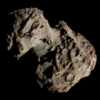C/1921 H1 (Dubiago)
Tools
Actions
General
Print/export
In other projects
Appearance
From Wikipedia, the free encyclopedia
Halley-type comet
| Discovery | |
|---|---|
| Discovered by | Alexander Dubyago |
| Discovery site | Kazan Observatory |
| Discovery date | 24 April 1921 |
| Orbital characteristics[1] | |
| Epoch | 21 May 1921 (JD 2422830.5) |
| Observation arc | 40 days |
| Number of observations | 27 |
| Aphelion | 33.088 AU |
| Perihelion | 1.1161 AU |
| Semi-major axis | 17.102 AU |
| Eccentricity | 0.93474 |
| Orbital period | 70.73 years |
| Inclination | 22.345° |
| 67.127° | |
| Argument of periapsis | 97.481° |
| Last perihelion | 5 May 1921 (last observation) 9 August 1982 (calculated) |
| Next perihelion | 25 June 2041 |
| TJupiter | 1.496 |
| Earth MOID | 0.384 AU |
| Jupiter MOID | 0.817 AU |
| Physical characteristics[2] | |
| 10.5 (1921 apparition) | |
Dubiago's Comet, formally known as C/1921 H1 by its modern nomenclature, is a faint Halley-type comet that completes an orbit around the Sun once every 61–79 years.[2] It was predicted to return in 1982, but it was not observed. It will next return to the inner Solar System by 2041.
References
[edit]- ^ "C/1921 H1 (Dubiago) – JPL Small-Body Database Lookup". ssd.jpl.nasa.gov. Jet Propulsion Laboratory. Retrieved 4 January 2024.
- ^ a b G. W. Kronk (2003). "C/1921 H1 (Dubiago)". Cometography.com. Retrieved 20 September 2024.
External links
[edit]- C/1921 H1 at the JPL Small-Body Database
This comet-related article is a stub. You can help Wikipedia by expanding it. |


